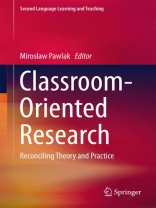This collection gathers contributions from scholars from Poland and abroad addressing different facets of research into the processes of foreign-language and second-language learning and teaching as they transpire in a typical language classroom. The book is divided into three parts, which address in turn: research directions and methodology, the findings of empirical research, and links between theoretical considerations and classroom practice. Accordingly, the first part includes papers that examine the role of different research paradigms, put forward concrete research proposals, present innovative data gathering tools or assess the role of such instruments in language teaching. The second part includes reports on original research studies focusing e.g. on teachers’ beliefs, the role of lexis and pragmatics, the application of modern technologies, the teaching and assessment of primary school children, and the development of social skills from a cross-cultural perspective. Finally, the third part of the book demonstrates how theory-driven approaches can enhance the effectiveness of instructed second language acquisition.
Table of Content
Hanna Komorowska Quantitative and qualitative classroom research – friendship or war?.- Dorota Werbińska Learning from retired language teachers’ biographies: A research proposal.- Anna Mystkowska-Wiertelak and Mirosław Pawlak Designing a tool for measuring the interrelationships between l2 WTC and confidence, beliefs, motivation, and context.- Melanie Ellis Capturing effective teaching: The construct of an observation scheme.- Emilie Martinez Methodological and ethical issues in research interviewing with a multicultural group of university students: Are there ‘dos’ and ‘don’ts’?.- Małgorzata Baran-Łucarz First attempts at conceptualizing and measuring the construct of pronunciation anxiety.












